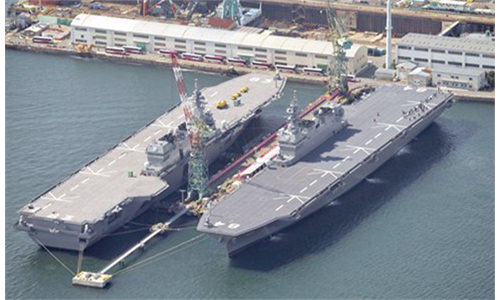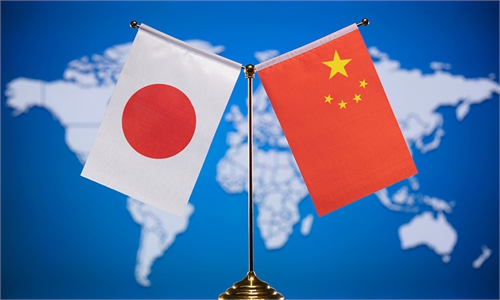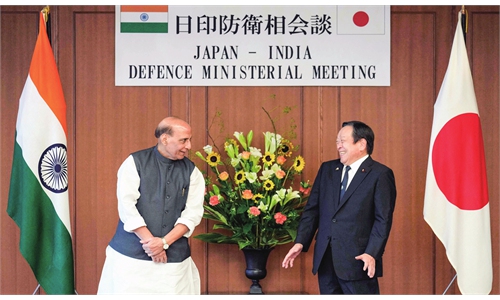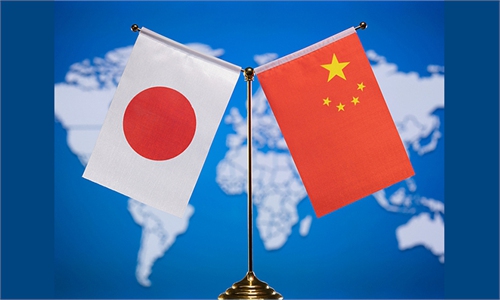Tokyo warned not to provoke Beijing on sensitive issues decade after Japan’s unilateral, unlawful attempt to nationalize Diaoyu Islands
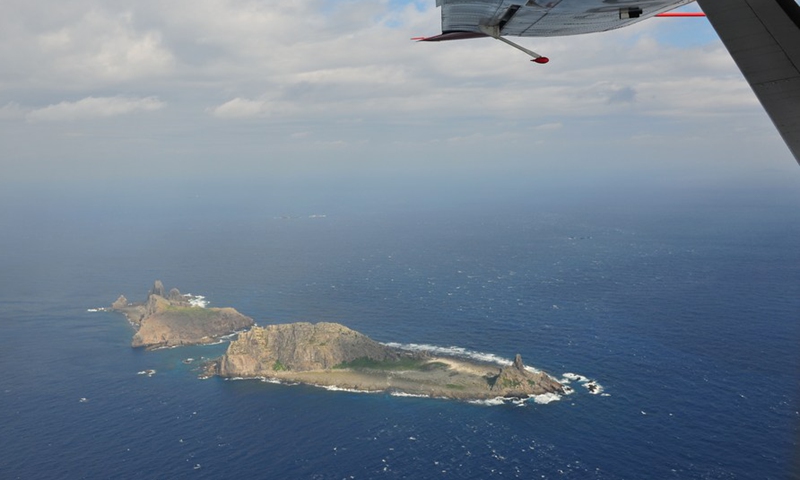
File photo taken on a marine surveillance plane B-3837 shows the Diaoyu Islands and nearby islands.Photo:Xinhua
Although China and Japan are about to welcome the 50th anniversary of the normalization of bilateral relations on September 29, tensions persist as Japan is moving toward a wrong direction to follow the US to contain China and provoke China on some sensitive issues, including the Diaoyu Islands issue, observers warned.
Chinese senior politicians have raised practical suggestions and far-sighted views in dealing with China-Japan tensions. For example, Chinese State Councilor and Foreign Minister Wang Yi delivered a video speech on Monday at the opening ceremony of a seminar commemorating the 50th anniversary of the normalization of China-Japan diplomatic relations, noting that the two countries are partners and pose no threat to each other, and the political consensus should be implemented at the policy level.
Mao Ning, spokesperson of the Chinese Foreign Ministry, said at a press conference on Tuesday that Wang put forward a five-point view on building China-Japan relations that meets the demands of the new era.
Wang said that on major issues of principle such as history and the Taiwan question, which are fundamental ones concerning China-Japan relations, there should be no ambiguity or backsliding.
The two sides should remove distractions and properly handle differences to ensure that the ship of China-Japan relations does not run aground or drift off course, he said.
Wang's remarks came after the China-Japan "dispute" over the Diaoyu Islands made headlines in mainstream Japanese media outlets, including Kyodo News and the Japan News, on Sunday, which marked 10 years since Japan's unilateral and unlawful attempt to put the islands under state control.
The Japanese media outlets hyped China's so-called military threats in the East China Sea and claimed that China's activities, including sending its coast guard vessels into the waters, have sparked "extreme concern" from Tokyo.
Chinese observers criticized that Tokyo and some Japanese media have never given up on smearing China's legitimate activities around the islands and hyping the so-called China threat, warning that Japan's irresponsible remarks would cast shadows over bilateral ties.
Refuting the irresponsible remarks, observers said that in the decade since Japan's farce of the unlawful nationalization of the Diaoyu Islands, China has realized the normalization of law enforcement patrols in waters around the islands and crushed Japan's attempts to unilaterally change the status quo and occupy China's inherent territory.
According to a white paper released by China's State Council Information Office in September 2012, Japan's occupation of the Diaoyu Islands during the Sino-Japanese War in 1895 was illegal and invalid.
After World War II, the Diaoyu Islands were returned to China in accordance with such international legal documents as the Cairo Declaration and the Potsdam Proclamation. No matter what unilateral step Japan takes over the islands, it will not change the fact that the islands belong to China.
The white paper said that for quite some time, Japan has repeatedly stirred up trouble on the issue of the Diaoyu Islands. On September 10, 2012, the Japanese government announced the "purchase" of the Diaoyu Island and its affiliated Nanxiao Island and Beixiao Island, and the implementation of so-called nationalization.
This move grossly violated China's territorial sovereignty and seriously trampled on historical facts and international jurisprudence, said the white paper.
During the 10 years since the unlawful nationalization of the islands, the balance of naval power between China and Japan has changed dramatically, Song Zhongping, a Chinese military expert and TV commentator, told the Global Times on Tuesday. Both Chinese military and law enforcement forces are developing in parallel, and there is nothing comparable in Japan, the expert pointed out.
On one hand, the military capability of the Navy of People's Liberation Army has improved greatly. The number of warships is increasing, the tonnage of the warships is increasing and their sustainable combat capability is becoming stronger, Song noted. On the other hand, the number of China's coast guard vessels is also increasing, with many 10,000-ton coast guard vessels. All these facts showed that China attaches great importance to protecting its maritime rights, Song said.
In its efforts to safeguard its territorial sovereignty over the Diaoyu Islands during the decade, China has achieved some breakthroughs and seized the initiative, Da Zhigang, director of the Institute of Northeast Asian Studies at the Heilongjiang Provincial Academy of Social Sciences, told the Global Times.
China has realized regular law enforcement patrols in the waters around the Diaoyu Islands, and it has also successfully enabled more members of the international community to understand the history of the issue, Da said.
But observers warned that Japan would continue to draw the US to engage in the Diaoyu Islands issue, while the US will also use the issue to bind Japan and make it cooperate with the Indo-Pacific Strategy to contain China's peaceful development.
"The Diaoyu Islands issue is an important excuse for the US to pull in Japan and other allies to suppress China. They will play up the 'threat' of Chinese law enforcement forces over the Diaoyu Islands," Song said.
Da said that judging from the current attitude of Tokyo and its plan to increase defense spending, the hope of solving the issue through peaceful and diplomatic means is getting weaker.
As the Japanese government is getting more conservative and the Japanese media are constantly hyping the so-called China threat, political mutual trust between the two countries has been weakened, the feelings of the two peoples have been hurt, and even various exchanges between economic circles and cultures have been affected, all of which has overshadowed the commemorations for the 50th anniversary of normalization of bilateral relations, Da noted.

